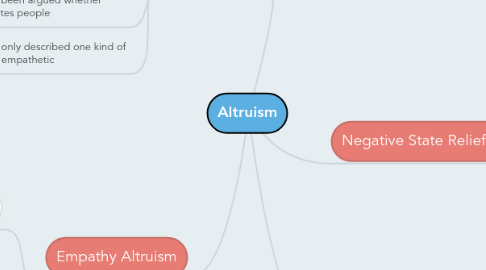
1. Empathy Altruism
1.1. Batson et al(1981)
1.1.1. Aim- investigate the levels of empathy in students. Participants were told a student had broken her legs and that she would need help taking lecture notes. They were then played a video recording of the student, Carol.
1.1.2. Condition One of empathy level- participants are asked to image how Carol might be feeling(high empathy condition)
1.1.3. Condition Two of empathy level- participants told to be objective and not be concerned about her(low empathy condition)
1.1.4. Condition One of high or low cost conditions-Participants told Carol would be in class and it would therefore be embarrassing if they denied her the lecture notes
1.1.5. Condition Two of high or low cost conditions- Participants told Carol would not be in class and it would therefore not be embarrassing to deny her the lecture notes.
1.1.6. Findings- people in the high empathy group were more likely to help Carol in either conditions, whereas people from the low empathy group were more likely to only help Carol in the high cost condition
1.2. Two types of emotions are triggered when an individual sees another suffering
1.2.1. Personal Distress- anxiety and fear, which leads to egoistic helping
1.2.2. Empathetic Concern- compassion and empathy, which leads to altruistic helping
2. Differences
2.1. Batson did not include the importance of reward on personal motivation,, merely personal distress as
2.2. Batson's conclusions makes it easier to predict behaviour but not the levels of empathy, and rather suggests that empathy is innate
2.3. Negative state relief does not accurately predict behaviour and it has been argued whether distress really motivates people
2.4. Schaller and Cialdini only described one kind of motivation for being empathetic
3. Negative State Relief Model
3.1. Schaller and Cialdini(1988)
3.1.1. We are motivated by egoistic reasons to help others in bad circumstances in order to reduce personal distress from observing the negative situation
3.1.2. Individuals in a sad or negative mood are more likely to help others out of the belief that they will be rewarded to for something for another people
